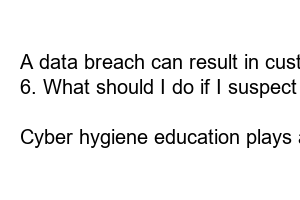세탁업 사이버 위생교육
Title: Enhancing Cyber Hygiene Education in the Laundry Industry: A Must for Safer Operations
Introduction:
In today’s digital age, where technology is shaping every aspect of our lives, it is crucial to prioritize cybersecurity. While industries such as finance and healthcare have been proactive in adopting stringent measures, the laundry industry often goes overlooked. In this blog post, we will explore the importance of cyber hygiene education in the laundry industry, and why it is time for a paradigm shift in this regard.
1. Cyber Threats: An Unseen Challenge:
As the laundry industry becomes more technology-dependent, it opens the door for potential cyber threats. These threats can include data breaches, ransomware attacks, and financial fraud. The consequences of such attacks not only compromise sensitive customer and business data but also disrupt business operations and erode customer trust.
2. Understanding Cyber Hygiene:
**Cyber hygiene** refers to the practices and precautions individuals and organizations take to ensure the security of their digital assets. By integrating cyber hygiene practices into daily operations, laundry businesses can significantly mitigate cyber threats and protect sensitive information.
3. The Need for Cyber Hygiene Education in the Laundry Industry:
While awareness of cyber threats is rising, there is still a significant knowledge gap within the laundry industry. By providing comprehensive and practical **cyber hygiene education**, laundry business owners and employees can become equipped with the necessary tools and knowledge to identify and prevent potential cyber risks.
4. Key Cyber Hygiene Practices for the Laundry Industry:
– Regularly update software and security systems to protect against vulnerabilities.
– Implement secure password management practices and encourage frequent password changes.
– Train employees on identifying phishing emails and other social engineering techniques.
– Regularly backup and encrypt critical data to minimize the impact of potential attacks.
– Establish dedicated IT support to promptly address any cybersecurity concerns.
– Conduct regular audits, risk assessments, and penetration testing to identify vulnerabilities.
5. Benefits of Cyber Hygiene Education:
Enabling cyber hygiene education in the laundry industry brings numerous benefits. It ensures a safer operating environment, safeguards customer and business data, strengthens customer trust, and helps comply with data protection regulations. By investing in cyber hygiene education, laundry business owners can avoid the significant financial and reputational losses that can occur due to a cyber attack.
6. Integrating Cyber Hygiene Education into Operational Practices:
The integration of cyber hygiene education should be a holistic approach that involves continuous training programs, awareness campaigns, and regular assessments to evaluate the effectiveness of implemented practices. By fostering a culture of cyber awareness, laundry businesses can stay one step ahead of potential cyber threats.
FAQs:
1. How often should an employee’s password be changed?
It is recommended to change passwords every 90 days to minimize the risk of unauthorized access.
2. Can cyber hygiene education prevent all cyberattacks?
While cyber hygiene education significantly reduces the risk of cyberattacks, it cannot eliminate them entirely. However, it enables businesses to detect and respond to potential threats promptly.
3. Are small laundry businesses at risk of cyber threats?
Yes, small laundry businesses are also at risk of cyber threats. Cybercriminals often target small businesses as they may have fewer security measures in place.
4. How often should backups be performed?
Regular backups should be performed at least once a day to ensure the availability of up-to-date data if a cyber attack occurs.
5. What are the consequences of a data breach in the laundry industry?
A data breach can result in customer information exposure, reputational damage, legal liabilities, and financial losses.
6. What should I do if I suspect a cyber threat?
If you suspect a cyber threat, immediately disconnect from the network and report the incident to your IT support or cybersecurity professionals.
Summary:
Cyber hygiene education plays a pivotal role in safeguarding the laundry industry from cyber threats. By investing in comprehensive training programs and implementing best practices, businesses can create a secure environment that protects customer data, enhances operational resilience, and strengthens trust with clients. It is high time for the laundry industry to prioritize cybersecurity and ensure that cyber hygiene remains a central focus for all industry players.

